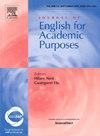一个基于意义的学术词汇表
IF 3.4
1区 文学
Q1 EDUCATION & EDUCATIONAL RESEARCH
引用次数: 0
摘要
学生必须有很强的词汇量才能有效地理解学术文章。为了帮助解决这个问题,已经开发了几个学术词汇表。然而,关于是否在这些列表中包括“paper”和“state”等常用词,文献中存在着持续的争论。出现这种冲突是因为以前的研究没有区分这些词的不同含义。在本文中,我们使用一个大型语言模型BERT对英语语料库进行语义注释,分别处理单词的每个意思。因此,我们开发了一个基于含义的学术词汇表,其中包括1550个单词(或词汇),这些单词只关注它们的学术含义。这些词在不同的学科中都很常见,在学术文本中使用得更频繁,在各种学术语料库中也有代表性。本文通过将“paper”(意为“一张纸”)归类为一般词汇,而将“paper”(意为“一篇文章”)归类为学术词汇,有效地解决了关于某些常用词是否应该纳入学术词汇表的争论。本文章由计算机程序翻译,如有差异,请以英文原文为准。
A meaning-based academic vocabulary list
Students must have a strong vocabulary to comprehend academic texts effectively. To assist with this, several academic word lists have been developed. However, there is an ongoing debate in the literature about whether to include common words, such as “paper” and “state”, in these lists. This conflict arises because previous studies did not differentiate between the various meanings of these words. In this article, we used a large language model, BERT, to semantically annotate English corpora, treating each sense of a word separately. As a result, we developed a meaning-based academic vocabulary list, comprising 1550 words (or lexemes) that focus solely on their academic meanings. The words on this list are found to be common across different disciplines, more frequently used in academic texts, and representative in various academic corpora. By categorizing “paper” (meaning “a sheet”) as a general word while “paper” (meaning “an essay”) as an academic word, this article effectively solved the debate over whether certain common words should be included in an academic vocabulary list.
求助全文
通过发布文献求助,成功后即可免费获取论文全文。
去求助
来源期刊

Journal of English for Academic Purposes
Multiple-
CiteScore
6.60
自引率
13.30%
发文量
81
审稿时长
57 days
期刊介绍:
The Journal of English for Academic Purposes provides a forum for the dissemination of information and views which enables practitioners of and researchers in EAP to keep current with developments in their field and to contribute to its continued updating. JEAP publishes articles, book reviews, conference reports, and academic exchanges in the linguistic, sociolinguistic and psycholinguistic description of English as it occurs in the contexts of academic study and scholarly exchange itself.
 求助内容:
求助内容: 应助结果提醒方式:
应助结果提醒方式:


